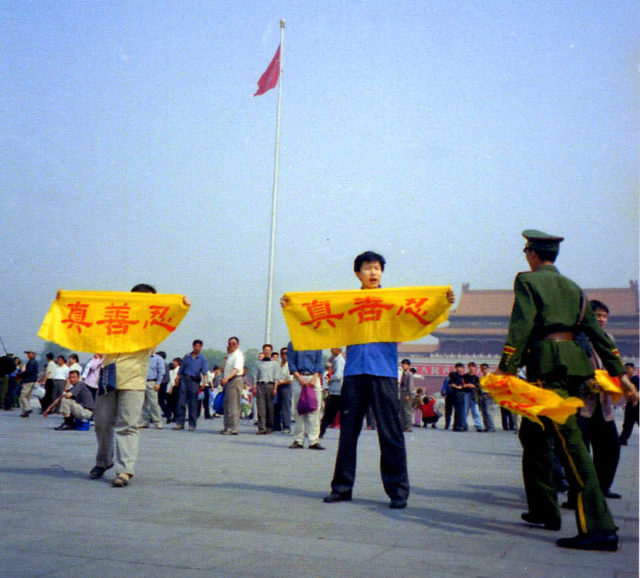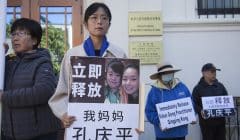Falun Gong: Life Under Persecution

Falun Gong practitioners unfurl banners in Tiananmen Square in peaceful protest as a police officer approaches.
For the tens of millions in China who practiced Falun Gong as of 1999, living the life of Falun has come to mean something dramatically different in recent years, though the practice itself remains unchanged.
Since July of 1999, adherents of the Falun Gong have been the victims of a litany of human rights violations and deprivations at the hands of China’s communist authorities, who officially outlaw the practice. Yet all indicators, including sources in China, tell that millions continue to practice despite the Party-state’s edict.
Life as Falun Gong has thus taken on very different features in China.
First, the practice of Falun Gong proper — its exercises, meditation, and study of teachings — has been driven underground by the repressive state apparatus. That is, any public expression of Falun Gong, such as performing its exercises in a park, is certain to bring arrest and quite possibly dire consequences. Gatherings in private are outlawed as well, however, as is any online discussion.
This has effectively meant that networks of relations have shrunk and taken on new configurations; community has been reconfigured on a more local, and perhaps personal, scale. Little study has been done on what exactly this means for the Falun Gong identity.
One ironic, if unlikely, change is that China’s Falun Gong contingent has had to become more international even as it becomes less public; the central community of adherents is now a virtual one, i.e., one online, in the form of a website (Minghui.org) that is hosted in West. But even the viability of this community is not ensured without great effort; just to access Falun Gong websites requires sophisticated technology, owing to the Communist Party’s internet censorship.
The second major development is a remarkable campaign to remedy the oppression and its many ill effects. A grassroots effort of enormous — and still expanding — proportions has arisen in response to the unfair, and often brutal, treatment visited upon the group.
Ordinary citizens have risen up to do extraordinary things in this capacity, often putting themselves at tremendous risk for the sake of principle.
One feature of this effort involves trying to undo the effects of repeated waves of pervasive, acerbic, government produced propaganda. The Falun Gong have labored to get reliable and fair information about their practice into the hands of fellow citizens. This has assumed a variety of forms, such as doing mailings; clandestinely posting informational flyers; sending emails; making phone calls; handing out leaflets in crowded markets; frequenting online chatrooms, and so on.
A second feature is to try to expose more broadly human rights violations being perpetrated by China’s communist regime. This assumes many of the same forms as above (and often, indeed, the two efforts overlap) as well as gathering and disseminating information overseas. Posting the details of police abuse on international websites and getting it into the hands of human rights groups can act as a powerful deterrent locally. Postings can also appear on lampposts, billboards, and most any other amenable surface locally in China. Another effective approach has been to place phone calls to labor camps and prisons, where abuses are most severe, and directly confront those accountable.
(For a detailed account of Falun Gong’s efforts in China, see “Righteous Resistance”)
While the oppression, or genocide as some have labeled it, is taking place in China, it has nevertheless impacted the lives of Falun Gong adherents around the world since 1999 as well.
One reason is that Chinese authorities have exported their campaign, as it were, to foreign soil. A number of Chinese agents are known to have taken action to intimidate, deter, and coerce followers of Falun Gong (as well as their supporters) in the West. So severe have been the tactics as to prompt a U.S. congressional resolution specific to the matter. (resolution)
Adherents have found the tires of their cars slashed; their homes vandalized and ransacked; received death threats and harassing calls; had their computers hacked into; and even, in several cases, been physically assaulted.
The combination of these direct offenses, along with concern for the wellbeing of practitioners in China, has led the Falun Gong in the West and elsewhere in Asia to adopt a wide variety of means of response.
The approach is referred to collectively in Falun Gong parlance as “clarifying the truth” (i.e., about what’s happening), or “jiangqing zhenxiang” in Chinese.
Among the most notable of these is perhaps the creative array of public activities. In New York City, for example, a year long awareness drive saw hundreds of volunteers doing torture re-enactments on the sidewalks of crowded streets, handing out newspapers and various flyers, staging marches, gathering signatures, holding vigils, and outreach in the schools, among other events.
Of note is that all such initiatives have been fully self-funded, and are typically initiated by none other than the participating individuals themselves, making for a truly “grassroots” movement.






